- europages
- >
- COMPANIES - SUPPLIERS - SERVICE PROVIDERS
- >
- alloy work
Results for
Alloy work - Import export
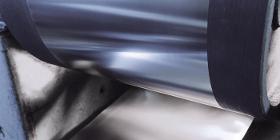
AMETEK SPECIALTY METAL PRODUCTS
United States
SS 305 is an austenitic Chromium-Nickel stainless steel with excellent corrosion resistance, and is suitable for very severe cold forming operations. A high nickel content reduces the work hardening rate so that it can be formed into electronic components and remain non-magnetic. The alloy is readily formable and work hardens slowly.It has good resistance to nitric and sulfuric acid solutions although it will not resist halogen acids. The alloy can be satisfactorily welded, brazed, and soldered. Available Sizes: SS 305 is available from Hamilton Precision Metals as strip product in thicknesses from 0.0005” to 0.050” (0.0127 mm to 1.27 mm) in widths up to 12.0” (304.8 mm). It is also available in foil as thin as 0.000200” (0.00508 mm) in widths of 4.0” (101.6 mm) maximum. The material conforms to ASTM A240, QQS-766, and UNS S30500.
Request for a quote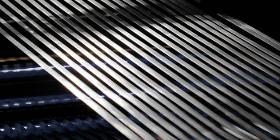
AMETEK SPECIALTY METAL PRODUCTS
United States
Ti Grade 9 is a near alpha, alpha-beta alloy, sometimes referred to as “half-6-4.” It offers 20 to 50% higher tensile strength than the commercially pure titanium at room and elevated temperatures. It is much more amenable to cold working than Ti 6AI/4V alloy and can be cold worked 75 to 85% to result in moderately high strength and good ductility The alloy can be formed from the annealed temper. Severe forming may be aided by an intermediate stress relief. Stress relieving may be appropriate after severe cold forming to remove residual stresses. Weldability and corrosion resistance is very similar to commercially pure titanium. Welding should be performed with inert gas shielded arc or spot welding.Welding with active gases, coatings, or fluxes must be avoided to prevent embrittlement.
Request for a quote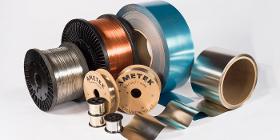
AMETEK SPECIALTY METAL PRODUCTS
United States
L-605™ is a nonmagnetic cobalt-based chromium-tungstennickel alloy that has excellent corrosion and oxidation resistance, and high strength at both room and elevated temperatures. Through work hardening, high strength levels can be obtained. L-605™ has a minimal heat treatment response, but can be used in the cold worked and aged condition. Applications include medical implant devices, springs, valves, and engine components for the aerospace industry. As a result of its high tungsten content, L-605TM is radiopaque, which is beneficial for implant medical devices, such as stents. Because of the alloy’s high work hardening rate, only minimal reductions can be taken before solution annealing will be required. L-605TM is very resistant to oxidation and scaling at elevated temperatures, and is nonmagnetic in all conditions. L-605™ is produced by vacuum induction melting followed by electroslag remelting (VIM-ESR), and as such, has a low nonmetallic inclusion level.
Request for a quote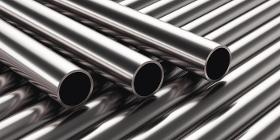
AMETEK SPECIALTY METAL PRODUCTS
United States
Ti 3AI/2.5V (Titanium Grade 9) alloy is a near alpha, alpha-beta alloy, sometimes referred to as “half-6-4.” It offers 20 to 50% higher tensile strength than the commercially pure titanium at room and elevated temperatures. It is much more amenable to cold working than Ti 6AI/4V alloy and can be cold worked 75 to 85% to result in moderately high strength and good ductility. Furthermore, it is weldable as the commercially pure grades and has excellent resistance to torsion and corrosion.Ti 6Al/4V is significantly stronger than commercially pure titanium while having the same stiffness and thermal properties excluding thermal conductivity, which is about 60% lower in Grade 5 Ti than in CP Ti. Amongst its many advantages, it is heat treatable. Please note that we have a minimum order value of £10,000.
Request for a quote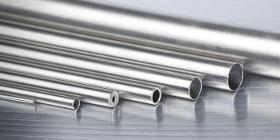
AMETEK SPECIALTY METAL PRODUCTS
United States
Because of its strength, unique density and corrosion resistance, titanium has found applications in many industries. For high quality tubing products, it’s often a better substance to use than competing materials like stainless steels or super alloys. Titanium tubes are light weight and exceptionally corrosion and heat resistantThe density of titanium is about 60 per cent of that of steel- or nickel-based alloys giving significant weight savings in aerospace structures. The tensile strength is better than that of austenitic or ferritic stainless steels. Titanium is exceptionally corrosion resistant and exceeds the resistance of stainless steels in most environments. The metal is non-magnetic too, and has good heat transfer properties, with a melting point higher than steel alloys. Titanium is easily worked. Please note that we have a minimum order value of £10,000.
Request for a quoteDo you sell or make similar products?
Sign up to europages and have your products listed

AMETEK SPECIALTY METAL PRODUCTS
United States
Havar® is a heat treatable Cobalt base alloy that provides very high strength. The alloy has excellent corrosion resistance and is non-magnetic. Applications have included metal diaphragms for aerospace sensors, metal diaphragms for burst discs, power springs, gap spacers in magnetic heads, and target foils in nuclear physics. Forming cold rolled Havar requires large radius (90° Bend – 8 X thickness) prior to age hardening. The joining can be accomplished using both welding and soldering techniques.The ultimate endurance life is achieved by heat treating the alloy at 1000°F after 80% cold work. The alloy will retain 75% of room temperature strength up to 950°F (Figure 1). Available Sizes: Havar® is available from Hamilton Precision Metals as strip product in thicknesses from 0.0005” to 0.025” (0.0127 mm to 0.635 mm) and widths to 7.5” (190.5 mm). A foil product is available in thicknesses down to 0.000060” and widths of 4.0” (101.6 mm). The material corresponds to UNS R30004.
Request for a quoteResults for
Alloy work - Import exportNumber of results
7 ProductsCountries
Company type